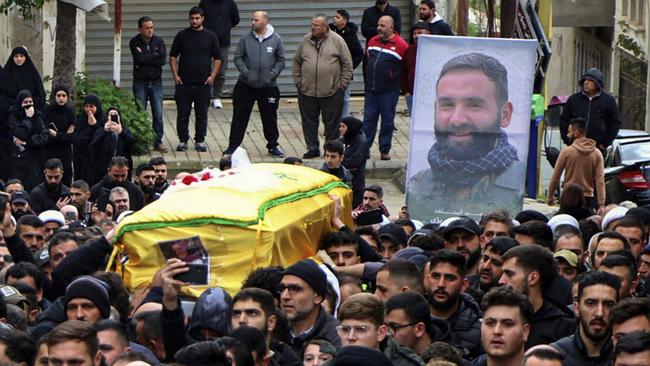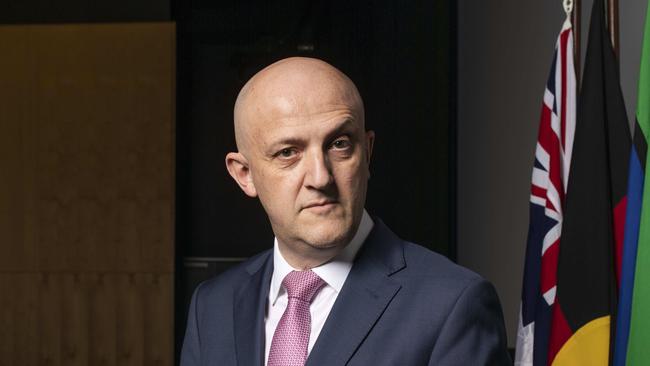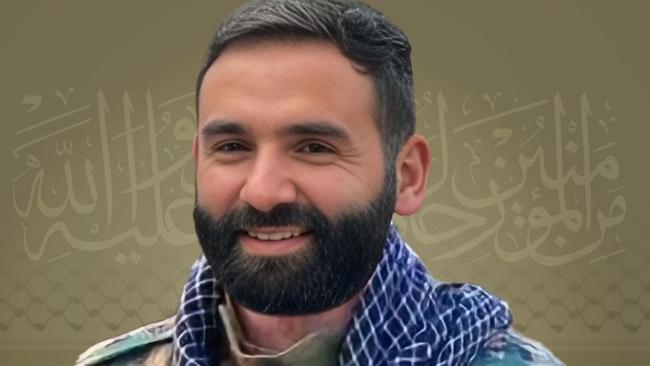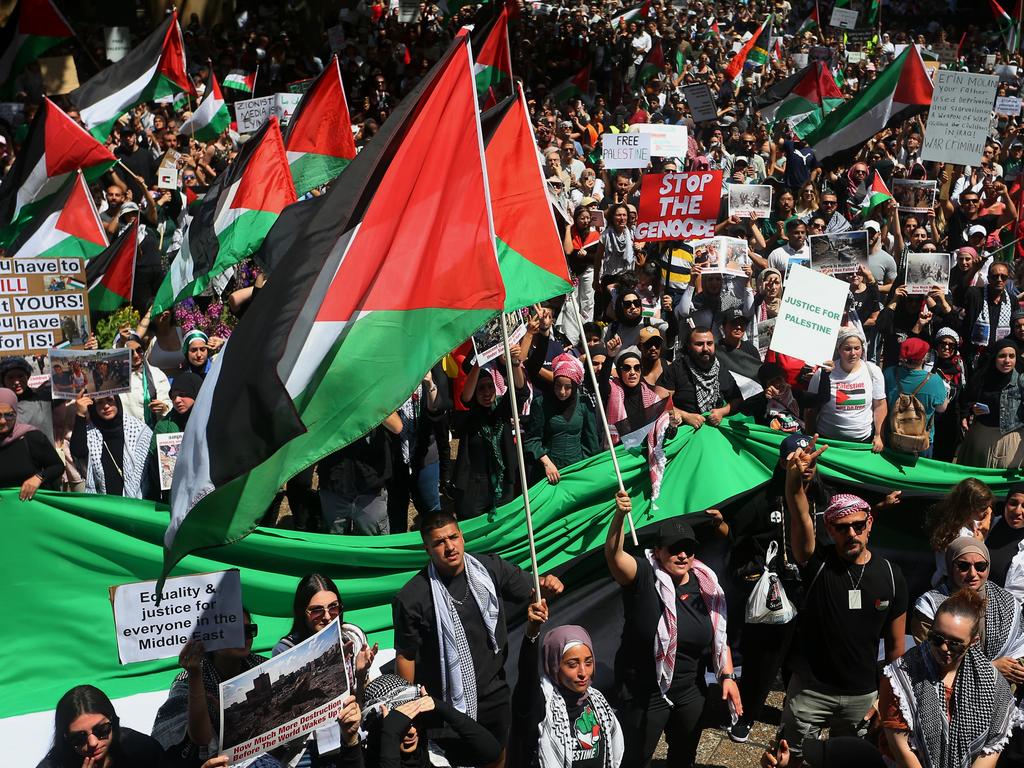Sleepwalking towards a fresh jihadist showdown
‘Pro-Palestinian’ protests should have rung alarms in democracies’ intelligence and security organisations that radicalised individuals would travel to the Middle East.

The extremism represented by Hamas, Hezbollah in Lebanon, the Houthis in Yemen, Palestinian Islamic Jihad in Gaza and the West Bank, and other groups in Syria and Iraq is more dangerous than ISIS because it is funded, trained, inspired and directed by Iran.
Islamic State’s ideology wanted a caliphate in Iraq and Syria. Although the group recruited around the world, its beliefs and behaviour were never likely to generate mass support.
Iran, by contrast, wants to advance its geopolitical ambition to dominate the Middle East by funding proxy organisations able to recruit more widely from the Arab street and their international supporters.
Iran’s proxy groups are jihadist extremists but not of the ISIS variety. Their focus harnesses nationalism to a strong anti-Jewish and anti-Zionist ideological core and a willingness to operate with, or to subvert, existing state institutions.
These groups are rightly designated terror organisations by many countries. Their ideology is attractive to more people, including some in Muslim diasporas in the West, along with unwise fellow-travellers on the progressive left of the Queers for Palestine variety.
Alarm bells should have rung in the intelligence and security organisations of many developed democracies when it became clear the October 7 attacks then led to co-ordinated and sustained “pro-Palestinian” protests in Australia, Europe, Britain, US and other democracies.
Countries should have been preparing for the risk that radicalised individuals would travel to Lebanon, Iraq, Syria and other Middle East locations where they could join the anti-Israel fight.
In Australia, significant numbers of individuals have done this very thing in past conflicts.
In the 1990s and the 2000s about 30 local jihadists travelled to Afghanistan to fight against the International Security Assistance Force, of which Australia was a prominent member.
In the mid-2010s, somewhere between 20,000 and 30,000 people joined Islamic State as fighters from around the world, 5000 from Western countries.
More than 200 Australians travelled to Syria and Iraq intending to join violent groups and establish by force the Islamic State caliphate.
Many more Australians supported these jihadists with financial and logistical backing. Rodger Shanahan reports in his excellent 2022 book, Islamic State in Australia, that at least two people sold houses to fund activities in Syria.
Shanahan’s assessment of the Australians who travelled to Syria was: “In the main they graduated from high school at the same rate as the rest of the population, didn’t have a criminal record, were largely employed and came from stable households. By most measures they appeared on the face of it to be well integrated into the society whose norms they rejected.”
Radicalised extremists who stayed in Australia planned and undertook several terrorist acts including the failed plot to bomb an Etihad Airways flight in July 2017, and the 2015 shooting of NSW Police employee Curtis Cheng outside Parramatta police headquarters.
Shanahan reviewed the court records of the 62 people “sentenced for Islamist terrorist offences in the Islamic State era” to find that only seven were contrite about their act. He concluded this lack of remorse presented an enduring security challenge: “(When) those offences involve religiously motivated violence it is of even greater concern for authorities and society more broadly.”
We should expect the same ideological factors to radicalise some Australians today, motivating them to leave the country to support Iranian-backed extremist organisations and to support that activity with money and other assistance.
Some hard-won lessons have been forgotten about the need to prevent people leaving Australia to undertake extremist acts, and the need to disrupt individuals moving from extremism to violent extremism among a cohort of Australian sympathisers.
The most striking aspect of federal, state, police and security agency public responses to the protests since October 7 is that they have been low key, failing to set hard boundaries around extremist behaviour.
ASIO director-general Mike Burgess issued a statement on October 12 warning people to mind their language to not inflame community tensions: “As always, ASIO is not interested in those who are engaged in lawful protest but, rather, the small subset of protesters who may wish to escalate protest to violence.”
Burgess said: “Protests, rallies and associated activities are expected to continue, and are likely to feature strong emotive claims.”

Governments have shown a marked reluctance to constrain protest activity, including ones clearly directed at Jewish institutions. State and federal governments have failed to address, refute or at least chide inflammatory rhetoric from Islamic preachers and spokesmen, beyond vague language condemning “rising anti-Semitism, Islamophobia and anti-Arab sentiment”.
Overwhelmingly, the government has treated the post-October 7 protests as an issue of social cohesion, requiring kid-glove treatment – not a precursor or enabler of extremist radicalisation.
This became clear at Attorney-General Mark Dreyfus’s press conference on Thursday. He refused to give any indication of official knowledge about the ideology, background or movements of Ali Bazzi, the Australian killed in Lebanon and identified by Hezbollah as one of its fighters.
Dreyfus’s focus seemed to be to assure us that “the Australian embassy in Beirut stands ready to provide consular assistance to the family if required”.
Asked if he knew of other Australians travelling to Lebanon to join a terrorist group, Dreyfus said: “I’m personally not aware of any such reports.”

What steps has the government taken since October 7 to identify and stop an exfiltration of potential extremists to the Middle East? Why has there been no concerted effort to stop a pattern of protests that enables radicalisation? Why has Australia not followed British and US steps on December 13 tightening travel restrictions on Hamas figures? With ASIO having reduced the terrorism threat level in 2022 from “probable” to “possible”, it is well past time for the government to review the adequacy of its light-handed approach on internal security.
Peter Jennings is director of Strategic Analysis Australia and was executive director of the Australian Strategic Policy Institute from 2012 to 2022. He is a former deputy secretary for strategy in the Defence Department (2009-12).








The horrific Hamas pre-emptive strike on Israel on October 7 should have been a global wake-up call that jihadist violent extremism was not eliminated by the defeat of the Islamic State group in the battle for Mosul in Iraq in 2017.